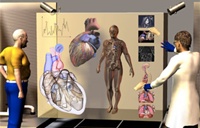In silico medicine ushers new research, treatment
22 May 2013
High performance computer power is being harnessed to revolutionise treatments for a wide range of diseases through ground-breaking virtual models in a joint project by the University of Sheffield and Sheffield Teaching Hospitals NHS Foundation Trust.
Treatments and clinical trials currently taking place in vitro – in a test tube – and in vivo – in a living organism – are now beginning to take place in silico, meaning through sophisticated computer simulation, built from our personal human data.
 |
| Med2© Virtual Physiological Human |
Experts from the INSIGNEO Institute for in silico Medicine – leading the world in constructing these complex computer representations – are building state-of-the-art patient-specific models for individualised, predictive healthcare, as well as creating new tools to model and simulate human physiology and disease processes, to improve outcomes in cancer, heart disease, brain surgery and many other conditions.
The INSIGNEO Institute for in silico Medicine – launched at the University on Thursday 9 May 2013 at Firth Hall – is pioneering the world-wide Virtual Physiological Human project, which aims to build a complete computational model of the human body that will improve both diagnosis and treatment, and will also enable individualised forecasting for everyone, capable of predicting their future health status.
INSIGNEO Director Professor Marco Viceconti of the University's Department of Mechanical Engineering says, ''Can you imagine weather forecasting without computers nowadays? In the same way that computers revolutionised weather forecasting, in silico medicine is bringing computers at the heart of healthcare; they will make possible to individualise the treatment, improve the care, and reduce the costs.''
At the Institute, more than 80 academics and clinicians are already developing computer simulations of disease processes that can be used directly in clinical practice to improve diagnosis and treatment.
A prototype computer system capable of detecting which heart patients need treatment is already in use in the Sheffield region; it works by creating a 3-D model of the coronary arteries during an angiogram (where multiple X-rays of the arteries are taken) and reduces the need for further invasive tests and procedures.
Dr Julian Gunn, a Consultant Cardiologist at Sheffield Teaching Hospitals NHS Foundation Trust and a senior lecturer at the University of Sheffield's Department of Cardiovascular Science, says, ''Heart disease remains one of the world's biggest killers, so we're delighted that the Sheffield team is leading the way with this research.
''Any patient with coronary heart disease who has an angiogram can, in the future, have a computerised assessment of the significance of their disease. This will enable the cardiologist or surgeon to know where to place a bypass graft or stent, without any further tests, so this is a real breakthrough for patients.
''The technology will further improve the diagnosis, reducing the need for some patients to have more invasive tests afterwards. It will also help doctors decide which arteries need treatment - even which bits of which arteries - and will guide therapy.''
The in silico system will enable academic, industrial and clinical researchers to improve their understanding of human physiology and pathology, to derive predictive hypotheses and simulations, and to develop and test new therapies, with the eventual outcome of improved disease diagnosis, treatment and prevention in healthcare.


















